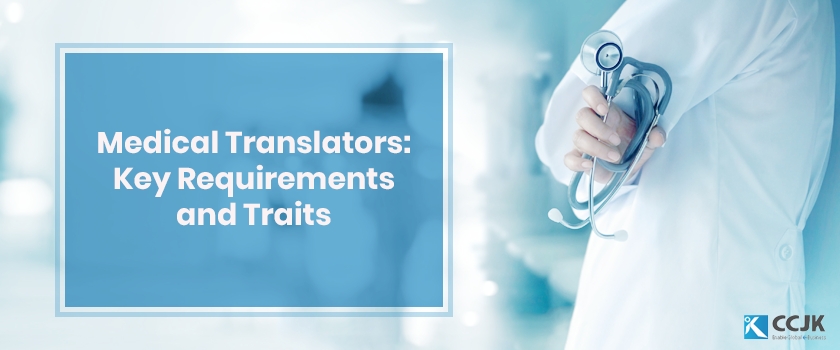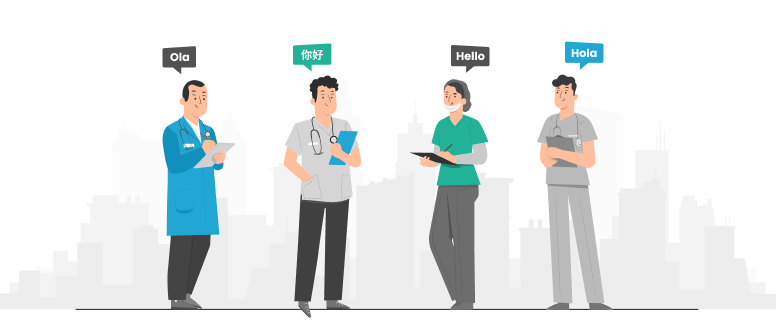Medical translation is one of the critical translations because human health and life depend upon it. The major challenge that comes with medical translation is that medical terminologies vary in every country. The medical translator should be aware of these terminologies.
Moreover, they need to keep themselves updated with every new research in the medical field. There is no room for error in medical translation. Therefore, it results in wrong medication to the patient that might take his life.
You should be fluent in a language pair. You should either be a native speaker or should know at least two languages. Also, with the language, you should have prior medical experience, training, and practice. He needs to pass language proficiency tests and clear medical certifications.
All professional translators need to fulfill these criteria. So, if they are handling some niche medical market, then requirements are even more.
What is Medical Translation
Medical translation includes translating various documents like case report forms, study protocols, adverse events reports, study budgets, study agreements, contracts with a research organization and regulatory authorities, informed consent forms, standard operating procedures, and patient diagnosis information. It also includes the translation of marketing material like patient information leaflets, labels, and details of product ingredients and their use.
Medical translation also takes account of translation-related to medical devices, hospital discharge documents, medical market research surveys, publications for medical journals, medical histories medical blogs, clinical trials, clinical protocols, and regulatory documents.
Requirements for Becoming a Medical Translator
100 percent accuracy is required in medical translation. Therefore, laymen cannot do the medical translation. Accuracy and precision are important when doing a medical translation. A prior medical experience that is associate with the medical subject is an additional advantage.
The translator should work with manufacturers of medical equipment, clinical research organizations and pharmaceutical companies, and healthcare managers. Medical companies and institutions rely on translators to deliver an error-free translation of sensitive medical data. No guesswork is required in medical translation.
A translator should have complete knowledge of local laws. Some countries in the world follow very strict laws regarding medical procedures and medical medicine approvals. The translator should know about the complications of the medicines and which medicines are banned in the country.
On the other hand, a medical translation should be provided on time so that appropriate healthcare should be provided to the patients. The medical industry uses thousands of medical jargon and terminologies that can not be used with changes. Thus the translator should develop the glossary of medical terms that will assist them in medical translation.
The medical translation should be done with utmost care because if you are translating any composition of medicine or any important medical procedure then it will be hazardous to the lives of the patients. To check the accuracy of medical translation the translator should proofread the medical documents several times before sending them to the client.
How to Become a Medical Translator
For becoming a translator, you should have a high school diploma. It will be more beneficial if you have a degree in the medical field, and if you have completed any medical assistant program. Also if you have deep knowledge of medical terminology, it can help to produce impeccable medical translation services.
You may find some translators that have done medical certification from the National Board of Certification for Medical Interpreters. Thus this certification is not enough because there are so many medical terminologies to translate that cannot be handle by that translator.
Therefore, if you are a beginner and want to pursue a career in Medical translation then you should start with a niche category. You can also start with translating product information leaflets or medical product descriptions. By translating these, you can also learn which drugs are banned in your country.
Reading is the best thing for a translator to polish his medical translation skills. For example, if you are in the EU, there are four medical approval procedures that you need to follow. The more you read these procedures, the more you learn.
You can also read about medical science from the European Medicines Agency that will increase your medical knowledge. By using the site’s database, you can learn how to translate medical term product descriptions. You can translate it in the required language then compare it with the original version to check the accuracy of the translation.
The medical field is full of new research and inventions. Therefore, the translator should keep reading the latest updates. So that he can get acquainted with all the latest medical knowledge. Reading medical research and updates will help you to develop a medical glossary.
Furthermore, it is beneficial if you read medical books in a pair of languages. Self-studying will enhance your medical knowledge and polish your medical translation skills. You should also try to buy a medical dictionary.
Apart from linguistic skills, you should have in-depth knowledge of the medical field. For instance, you should know the names of body parts in medical sciences. Also, you should know about lethal diseases and their treatments.
The other way to learn medical knowledge is to read nursing books that you can understand and follow easily. If you are an internet user then you can add the medical online resources in the bookmark. In this way, you can research offline and online.
Traits for Medical Translator
Besides knowledge of languages, a person who has an interest in the medical field. Moreover, If he has a feeling of empathy towards people can become a competent translator.
A good translator is update with medical knowledge. Furthermore, he knows the Medical rules and regulations of different countries like the European Union, Japan, Hongkong, and the United States.
This is because some medicines are banned in developed countries but people in developing countries are using them. If the translator knows all the latest updates about medical science. He can save many lives.
Bottom Line
Do you want to pursue your career as a medical translator? Your prior medical education, linguistic skills, experience knowledge, and the required traits will help you to become a competent translator.



